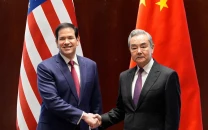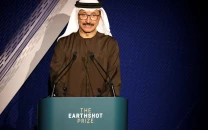A Surat diary
The day after the event, Surat was in danger of being flooded from an overflowing Tapi river again.

The writer is a columnist. He is also a former editor of the Mumbai-based English newspaper Mid Day and the Gujarati paper Divya Bhaskar
aakar.patel@tribune.com.pk
None of these cities resemble the utopia that many people seem to believe Narendra Modi has produced in our state. The cities of Gujarat look very much like Indian cities elsewhere: dirty streets, chaotic and undisciplined traffic, corrupt police, lawbreaking citizenry. Surat has its charms, but being paradise is not among them. Ahmedabad, a city lacking in any sort of charm whatsoever, is more representative of the Modi era — segregated, sullen and oppressively vegetarian.
The reason I was in Surat was a function to felicitate Mrs Homai Savai, founding principal of Sir JJ English School, from which my batch was the first to pass out, 25 years ago, in 1988. In those years, parents who wanted to put their children through a proper English school, in Surat, had four options: Lourdes Convent run by Carmelites, St Xavier’s run by Franciscans, Seventh Day Adventist run by Presbyterians and Sir JJ. Three set up by Christian denominations and one by the Parsis.
At the function, I asked whether all of us needed to reflect on what the contribution of our community has been to our city. The Parsis are in decline across the country, but you could not have told that from my school, which had hundreds of them. The day after the event, Surat was in danger of being flooded from an overflowing Tapi river again. Such a flood occurred in August 2006, when the Ukai dam upstream collected water in its catchment area during heavy rains and then, when it was sloshing full, was forced to release much of it, flooding downriver Surat. It was managed by the government with such incompetence that my parents, living in the middle of Surat, were stranded on their terrace, without food or water, for five days. This was the case with tens of thousands of Surtis that year and so, stories of Modi going heroically to save Indians in natural disasters outside Gujarat always amuse me.
This time round, the dam has not released as much water, but the people have no faith in the government. The flyovers are clogged by 7am with cars parked to avoid flood damage. The local legislative assembly member tweets:
At Umra Flood Gate Dont Create Any Panic Inflow of Ukai Has Been Decreased our CM Office nd Department is Concentrating on it @narendramodi
— Harsh Sanghavi (@sanghaviharsh) September 23, 2013
Why bring the chief minister into this? Does he have a tap in his office that will turn off the flow? Doesn’t Gujarat have a bureaucracy that functions without his attention? The problem, of course, is that when you set up a one-man rule, as Modi has, the work and effort of no other is valid or believed. Unless the big man is working on your problem, it won’t get solved. Alas, as we found out in the 2006 flood, even that may not sometimes work.
Surat is the only city in Gujarat with a robust presence of non-vegetarian street food. Some of this is because of the presence of mercantile Muslim communities — Dawoodi Bohras in particular. Another reason is that, unlike in Ahmedabad, the lower caste (and so non-vegetarian) Hindus are empowered, in Surat. There are communities like Khatris and Ghanchis whose eating and drinking habits make the city a lively and entertaining place. Modi is from the Ghanchi community (of oil pressers), but he is, of course, a non-drinking vegetarian.
Surat is Gujarat’s second largest city and is scheduled to be its largest in the next two decades. For a city that has 4.5 million people, Surat has the smallest, most modest airport in the world. People who bang on about Gujarat’s great infrastructure should explain why there are a total of only two flights that come to Surat daily, including one from state-run Air India, which probably comes because it is forced to. The wit will answer that this is so, because few people want to leave Surat. I do not disagree and it is a fine city, but for some reason I am always happy to leave.
Published in The Express Tribune, September 29th, 2013.
Like Opinion & Editorial on Facebook, follow @ETOpEd on Twitter to receive all updates on all our daily pieces.



















COMMENTS
Comments are moderated and generally will be posted if they are on-topic and not abusive.
For more information, please see our Comments FAQ